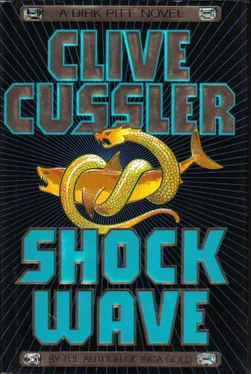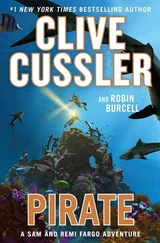Clive Cussler - Shock Wave
Здесь есть возможность читать онлайн «Clive Cussler - Shock Wave» весь текст электронной книги совершенно бесплатно (целиком полную версию без сокращений). В некоторых случаях можно слушать аудио, скачать через торрент в формате fb2 и присутствует краткое содержание. Год выпуска: 1996, ISBN: 1996, Издательство: Simon & Schuster, Жанр: Детектив, на английском языке. Описание произведения, (предисловие) а так же отзывы посетителей доступны на портале библиотеки ЛибКат.
- Название:Shock Wave
- Автор:
- Издательство:Simon & Schuster
- Жанр:
- Год:1996
- ISBN:978-0684802978
- Рейтинг книги:5 / 5. Голосов: 1
-
Избранное:Добавить в избранное
- Отзывы:
-
Ваша оценка:
- 100
- 1
- 2
- 3
- 4
- 5
Shock Wave: краткое содержание, описание и аннотация
Предлагаем к чтению аннотацию, описание, краткое содержание или предисловие (зависит от того, что написал сам автор книги «Shock Wave»). Если вы не нашли необходимую информацию о книге — напишите в комментариях, мы постараемся отыскать её.
Shock Wave — читать онлайн бесплатно полную книгу (весь текст) целиком
Ниже представлен текст книги, разбитый по страницам. Система сохранения места последней прочитанной страницы, позволяет с удобством читать онлайн бесплатно книгу «Shock Wave», без необходимости каждый раз заново искать на чём Вы остановились. Поставьте закладку, и сможете в любой момент перейти на страницу, на которой закончили чтение.
Интервал:
Закладка:
He moved to the control console and pulled himself to his feet, clutching the stand with both hands to keep from being pitched overboard. Again he squinted through swollen eyes toward the southeast.
He had become all too familiar with clouds on the horizon that gave the illusion of land rising from the sea. He was too used to seeing white tufts of cotton drifting over the outer edge of the sea, their uneven shapes and dark gray colors raising false hopes before altering form and gliding onward, driven by winds out of the west.
This time it was different. One solitary cloud on the horizon remained stationary while the others moved past it. It rose from the sea faintly but without any signature of mass. There was no indication of green vegetation because the cloud itself was not a piece of an island. It was formed by vapor rising from sun-baked sand before condensing in a colder level of air.
Pitt restrained any feelings of excitement and delight when he realized the island was still a good five hours’ sail away. There wasn’t a prayer of reaching it, even with the sail spread once more on the mast while the sea poured into the boat. Then his dashed hopes began to reassemble as he recognized it not as the top of an undersea mount that had thrust above the sea after a million years of volcanic activity and then nurtured lush green hills and valleys. This was a low, flat rock that supported a few unidentifiable trees that somehow survived the colder climate this far south of the tropic zone.
The trees, clearly visible, were clustered on the small areas of sand that filled the cracks of the rocks. Pitt now realized the island was much closer than it had seemed at first view. It lay no more than eight or nine kilometers away, the tops of the trees giving the impression of a shaggy rug being pulled over the horizon.
Pitt took a bearing on the island, noting that it precisely matched the kea’s course. Next he checked the wind direction and drift, and determined that the current would carry them around the northern tip. They would have to sail southeast on a starboard tack as Maeve had, amazingly, pictured in her imagination.
“The little lady wins a prize,” Pitt announced. “We’re within sight of land.”
Both Maeve and Giordino struggled to their feet, clung to Pitt and gazed at their distant hope of refuge. “She’s no mirage,” said Giordino with a big grin.
“I told you the kea would lead us to a safe harbor,” Maeve whispered softly in Pitt’s ear.
Pitt did not allow himself to be carried away by elation. “We’re not there yet. We’ll have to replace the sail and bail like hell if we’re to land on its shore.”
Giordino judged the distance separating them from the island, and his expression sobered considerably. “Our home-away-from-home won’t make it,” he predicted. “She’ll split in two before we’re halfway.”
The sail was raised, and any length of line that could he spared was used to tie the splitting hull together. With Maeve at the rudder, Giordino bailing like a crazy man and Pitt sloshing the water in sheets over the side with his bare hands, the ruptured boat set its bow directly toward the small, low-lying island a few kilometers distant. At long last they had visible proof that Pitt’s navigation had paid off.
The mind-drugging fatigue, the overwhelming exhaustion had dropped from Pitt and Giordino like a heavy rock. They entered a zone where they were no longer themselves, a psychological zone where another world of stress and suffering had no meaning. It didn’t matter that their bodies would pay heavily in agony later, as long as their sheer determination and refusal to accept defeat carried them across the gap separating the boat from the beckoning shore. They were aware of the pain screaming from their shoulders and backs, but the awareness was little more than an abstract protest from the mind. It was as if the torment belonged elsewhere.
The wind filled the sail, shoving the boat on a course for the solitary outcrop on the horizon. But the heartless sea was not about to release them from its grip. The current fought them, forking as it ran up against the shore and flowing in a loop past the outer limits of the island, threatening to push them back into the vast nothingness of the Pacific.
“I think we’re being swept around it,” Maeve said fearfully.
Facing forward as he frantically scooped the surging water out of the boat, Pitt seldom took his eyes off the nearing island. At first he thought they were seeing only one island, but as they approached within two kilometers he saw it was two. An arm of the sea, about a hundred meters in width, separated one from the other. He could also make out what appeared to be a tidal current running through the gap between the islands.
By the wind streaks on the surface and the spraying foam, Pitt could tell that the following breeze had shifted even more in their favor, blowing the boat on a sharper angle across the unfriendly current. That was a plus, he thought optimistically. The fact that the water this far south was too cold for coral reefs to form and wait in ambush to tear them to shreds didn’t hurt either.
As he and Giordino fought the incoming water, they became conscious of a sullen thunder that seemed to grow louder. A quick pause, and their eyes locked as they realized that it was the unique sound of surf pounding against rock cliffs. The waves had turned murderous and were drawing the boat ever closer into a fatal embrace. The castaways’ happy anticipation of setting foot on dry land again suddenly turned to a fear of being crushed in a thrashing sea.
Instead of a safe haven, what Pitt saw was a forbidding pair of rocks jutting abruptly from the sea, surrounded and struck by the onslaught of massive breakers. These were not tropical atolls with inviting white sand beaches and waving friendly natives, the stuff of Bali Hai, blessed by heaven and lush plant life. There was no sign of habitation on either island, no smoke, no structures of any kind to be seen. Barren, windswept and desolate they seemed a mysterious outpost of lava rock, their only vegetation a few clusters of low nonflowering plants and strange-looking trees whose growth appeared stunted.
He could not believe that he was in a war with unyielding stone and water for the third time since he had found and rescued Maeve on the Antarctic Peninsula. For a brief instant his thoughts raced back to the near escape of the Polar Queen and the flight from Kunghit Island with Mason Broadmoor. Both times he had mechanical power to carry him clear. Now he was fighting a watery burial on a little waterlogged boat with a sail not much bigger than a blanket.
The master seaman’s first consideration when encountering rough seas, he recalled reading somewhere, was the preservation of the stability of his boat. The good sailor should not allow his boat to take on water, which would affect her buoyancy. He wished that whoever wrote that was sitting beside him.
“Unless you see a stretch of beach to land on,” Pitt shouted at Maeve, “steer for the breach between the islands.”
Maeve’s lovely features, drawn and burned from the sun, became set and tense. She nodded silently, tightly gripped the rudder lines and focused every bit of her strength on the task.
The jagged walls that climbed above the crashing surf looked more menacing with each passing minute. Water was pouring alarmingly into the boat. Giordino ignored the approaching upheaval and concentrated on keeping the boat from sinking under them. To stop bailing now could have fatal consequences. Ten seconds of uninterrupted flow of seawater through the damaged boat and they would sink five hundred meters from shore. Struggling helpless in the water, if the sharks didn’t get them, the surge and rocks would. He kept bailing, never missing a beat, his faith and trust entirely in the hands of Pitt and Maeve.
Читать дальшеИнтервал:
Закладка:
Похожие книги на «Shock Wave»
Представляем Вашему вниманию похожие книги на «Shock Wave» списком для выбора. Мы отобрали схожую по названию и смыслу литературу в надежде предоставить читателям больше вариантов отыскать новые, интересные, ещё непрочитанные произведения.
Обсуждение, отзывы о книге «Shock Wave» и просто собственные мнения читателей. Оставьте ваши комментарии, напишите, что Вы думаете о произведении, его смысле или главных героях. Укажите что конкретно понравилось, а что нет, и почему Вы так считаете.












